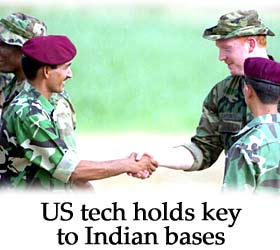Home > News > Specials
The Rediff Special/Josy Joseph in New Delhi
April 22, 2003

This article is the second of a six-part special series on Indo-US military relations. The first part dealt with the US attempts to gain access to Indian military bases and establish USAF airbases on Indian soil.
The series is based on 'Indo-US Military Relations: Expectations and Perceptions,' a US defence department-commissioned study, that is in possession of rediff.com.
If the Americans were to enjoy access to Indian military bases, what will India expect in return?
Indo-US Military Relations: Expectations and Perceptions, a classified US defence department document in rediff.com's possession, states that India would consider technology transfer as an 'important component' for a robust military relationship between the two countries. The 176-page document, which is being distributed to select policymakers under Distribution Statement F – one of the highest secrecy classification governing US documents – also highlights the lack of consensus between the different arms of the Indian government on long-term strategic forecasts.
The document is considered by military analysts to be the most detailed study of the Indo-US military relationship till date. It also has several unsparing comments from policymakers in both the US and India on what is lacking on both sides.
"The necessity of the US' adopting a more liberal, less restrictive technology transfer regimen toward India – and for the United States not to impede the transfer to India of critical military equipment and militarily-relevant technologies from third parties, Israel for example – emerged from the interviews with Indians in virtually every context," the report says.
For long America has denied India high technology and dual technology products on several occasions, thus delaying development of several key weapon systems adversely affecting operational abilities of Indian military. For instance, an important reason for the delay in the development of Light Combat Aircraft is the denial of American technologies, including the General Electric engines, some 40 of which have recently been given to India. Several Sea King naval helicopters were grounded after America denied critical components due to the post-1998 nuclear sanctions.
Key Indians interviewed in the report said, "America's reluctance to engage in focused technology transfer as a deal killer in the effort to construct an enduring strategic relationship." Indians placed technology transfer as the 'touchstone' of the new found strategic relationship and 'everything revolves around a strong US commitment to share its technologies so that India can advance'.
A senior Indian policy maker summed up: "If the United States is willing to share dual use technologies, then it suggests that the United States regards India as a partner that shares strategic concerns and burdens. If the United States denies access to dual use technology, then it gives the impression that India is not accepted or trusted."
While, Indians believe it is from technology transfer that the relationship would take off, the Americans argue that 'Indians' sole interest in the relationship is gaining access to US technology' because of various reasons.
Say US decision-makers, "The Indian military is feeling its weakness especially after witnessing the US capabilities in Afghanistan. Indian air power and C2 (Command and Control) are so limited that the Indian Air Force was surprised by capabilities that the US military takes for granted, such as airlift capacity."
There is more to the American argument, "The Indians are unhappy with the quality of the Russian equipment and have experienced problems in their deal with Israel and France. The United States is the preferred alternative."
The comment on Russia, Israel and France is sure to ruffle several feathers both within India and in those respective countries. Indian military is built around Russian equipment, while France and Israel have contributed some cutting edge systems and technologies such as Mirage 2000 fighters and advanced radar systems.
But there is a bigger and larger Indian demand that could in fact slow down the new relationship, or could even topple it. That India demand the relationship be 'an adult-to-adult' one and not a patronising one.
Indians have various reasons for making such a demand, but they put four broad points where this equality should be visible.
- The norms that govern interactions between two sovereign states must be applied.
- US technology transfer policy should treat India as a friend.
- A symbiotic relationship that connects the Indian military with the infrastructure in the continental United States.
- Sensitivity to Indian concerns, and increased consultations in policymaking in regions where both the US and India have shared interests.
Indian policymakers argue that US did not consult them enough before or during Operation Enduring Freedom 'in India's backyard'. In the 'non-Christian Indian Ocean Basin', India could have provided better inputs to the Americans during Operation Enduring Freedom, argue Indian officials. In fact, Indian intelligence agencies that in a rare show of generosity went a long way to assist their American counterparts are a disappointed lot today.
Senior intelligence officers told rediff.com that they are disappointed with the response of US agencies. Though several sensitive documents, intercepts and the like on Taliban, Osama bin Laden, Al Qaeda and other terrorist outfits were handed over to the Americans from the massive collection of India's intelligence on Islamic terrorism, the Americans responded disappointingly when it came to Indian interests, say senior officials.
Part I: Target next: Indian military bases
Part III: Of insults, obsessions and distrust
Part IV: Drawn, but not ready to fire
Part V: Tango's closer, but shop talk's taboo
Part VI: Spats apart, future's rosy
The Rediff Specials